Table of Contents
You pause a moment as you cross the threshold into your local vitamin shop. In front of you is row upon row of shelving displaying thousands of bottles and boxes of supplements.
An overwhelming experience even to the most experienced neurohacker.
Online stores can be even more confusing. Store algorithms decide what you first see when you begin your search.
Then your mind starts comparing individual capsule or tablet prices because you don’t recognize many of the brands displayed.
You’re not even thinking of the ongoing problem with counterfeit products masquerading as genuine brand name supplements. Or even well-known brands filling their supplement bottles with anything but what’s marked on the label.
Just one of many examples over the last few years comes from a 2013 investigation by Canadian researchers. The team used DNA testing on 44 bottles of brand name supplements sold by 12 companies.
Many of the dietary supplement bottles tested contained none of what the label said they did. Instead the bottles were filled with capsules containing soybeans, wheat, various grasses, and rice. In what were supposed to be nootropics like Ginkgo Biloba, St. John’s wort, and Ginseng.[i]
So how do you find brands you can trust to give you the benefits you need to achieve your neurohacking goals?
In this post you’ll discover how to choose a quality nootropic supplement. Sound advice based on what I’ve learned over the last 17 years. From spending $10’s of thousands on dietary supplements in dozens of online and local vitamin shops, and health food stores.
Choosing quality nootropic supplements
The following 7 steps will help you increase your odds of actually getting what you’re paying for.
Brand Names
As a general rule, stay away from drug store, department store and supermarket brands of supplements. Drug stores sell drugs and have little incentive to sell quality supplements to compete with one of their main sources of revenue – pharmaceuticals.
Department stores sell everything from appliances to furniture to clothes. And have no real incentive to ensure the quality of their private label supplements. Supermarkets sell food and other grocery items so their private label supplements are not a main money-maker.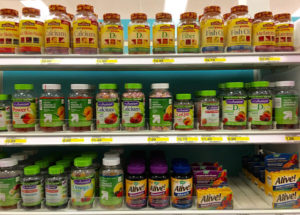
In 2015, the New York Attorney General demanded GNC, Target, Walgreens and Wal-Mart stop selling a number of their dietary supplements. Their investigation used DNA barcoding to analyze supplement bottle contents to compare to packaging labels.
The investigation discovered that all but five of the dietary supplements contained DNA that was either unrecognizable. Or from a plant other than what the product claimed to be.[ii]
When deciding on a brand, check out their website and ‘About’ page to find out who the company is. Find out how long they’ve been in business, and what their philosophy is toward manufacturing dietary supplements.
Find out what their customer service options are and how you can get ahold of someone if you have a question or complaint. The absence of any of this information is a red flag.
Check to see if the company offers a current Certificate of Analysis (CoA) for each supplement they produce that will verify the purity of their product. Or if a CoA is available on request. Absence of a CoA for each product is a red flag.
Check to see if the company provides evidence of a Quality Assurance certificate from a recognized 3rd party lab. I explain what to look for in these Certificates later in this article.
Read the reviews on Amazon, Swanson, iHerb and other nootropic supplement vendor websites. Find out what verified buyers of their products say about that product and company.
Pay attention to, or search for social media chatter about the supplement company to see what others are saying.
Check the Better Business Bureau for customer complaints. And do a Google search for law suits, negative reviews or media reports or stories about the company that can help you decide if the company is trustworthy.
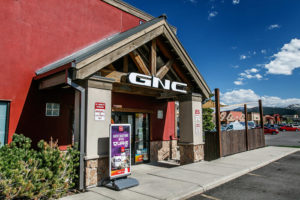 The main takeaway here is just because a company has a recognizable name does not mean they make quality supplements. As verified by the New York Attorney General.
The main takeaway here is just because a company has a recognizable name does not mean they make quality supplements. As verified by the New York Attorney General.
Once you find a company you know is trustworthy, do your best to buy the bulk of your nootropic supplements from them.
If you’re buying from an online supplement vendor, find out who the seller is. It should be sold by the original manufacturer or a company who has a track record of selling genuine products.
This is a bigger deal than most people realize. In 2013, a Natural News investigation found that the retail giant Amazon was allowing 3rd party sellers to sell counterfeit dietary supplements to unwary buyers.[iii]
The problem with Amazon and other online retail stores who allow nearly anyone a storefront is they don’t have the ability to police literally 10’s of thousands of 3rd party sellers who sell products through their site.
But it gets worse because you can’t rely on Amazon’s star review system either. All products that Amazon believes are identical on their site assigns the same star rating to that product. Regardless of who the seller is. You can read the entire story here for more > “Amazon.com (AMZN) sells fake, counterfeit nutritional products to unsuspecting consumers”
You must ensure that the company from whom you are purchasing a dietary supplement is legit. And has a track record and high quality reputation for selling genuine, pure nootropic supplements.
I’m not saying to avoid getting supplements from Amazon. I purchase nootropic supplements from various vendors on Amazon every month. The big takeaway here is “buyer beware” and do your research. Using the information you’ve learned here on Nootropics Expert.
-
Quality Assurance
In the United States, the FDA does not oversee every single supplement sold like they control pharmaceuticals. But it does regulate supplements to a certain extent under the Dietary Supplement Health and Education Act of 1994 (DSHEA).[iv]
The law prohibits supplement makers from marketing adulterated or misbranded products. And the FDA does take action against companies with an adulterated or misbranded product after it reaches the market.
But the administration itself says, “Dietary supplements are not approved by the government for safety and effectiveness before they are marketed.”
So supplement manufacturers are left to police themselves. It’s only when a product is found to be defective, and reported, that the FDA can take action.
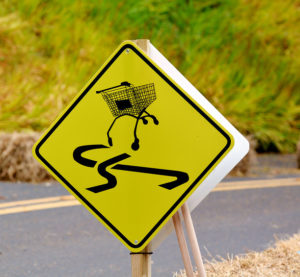 It’s buyer beware when buying nootropic supplements. So it’s up to you to check the label to find out where the supplement comes from.
It’s buyer beware when buying nootropic supplements. So it’s up to you to check the label to find out where the supplement comes from.
Some tests on U.S. products have shown defects. But supplements sourced from countries like China, India and Mexico are more likely to contain toxic ingredients, and even prescription drugs.[v]
The FDA provides an updated list of tainted supplements you can check here > Tainted Supplement List.
Choose reputable brands who have a track record of providing quality product. These companies will tell you their entire supply chain from farm to capsule. Their website and marketing material will tell you about purity testing before, during and after encapsulation.
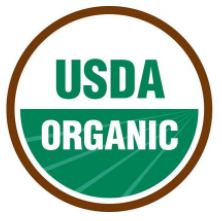 Check the label to see if it is USDA-certified organic which ensures the product is free of toxins, pesticides and herbicides. And check the label for certification seals. These are independent labs who test for quality and discussed in the next section.
Check the label to see if it is USDA-certified organic which ensures the product is free of toxins, pesticides and herbicides. And check the label for certification seals. These are independent labs who test for quality and discussed in the next section.
You can also contact the manufacturer and ask how they produce their products. They should be able to provide a lot-specific Certificate of Analysis if you request it. Find out if raw ingredients are sourced directly from the farms that grow them. Or if they come from distributors. And where those distributors source the raw ingredients.
-
Certificate of Analysis (CoA)
Several qualified independent labs test dietary and nootropic supplements for quality, potency and toxicity. Some dietary supplement manufacturers feature certification labels on their packaging. And lately I’ve seen supplement labels with a QR code that you can scan with your phone. The scan may allow you to download a Certificate of Analysis to your phone. Or it’ll take you to a page on their website where they explain how they test their supplements.
But QR code or not, I encourage you to make the effort to find the supplement maker’s website. And learn about their testing program. If a supplement company doesn’t have a comprehensive testing program in place you shouldn’t be buying their product. Find another company who makes or bottles the nootropic you’re looking for and who have a testing program in place.
The following are some of the larger testing laboratories that you’ll see on nootropic supplement labels …
The US Pharmacopeia provides a seal for labels verifying that a supplement is “USP Verified”. The company offers GMP (Good Manufacturing Practices) facility auditing, product testing, product quality control, and product documentation review. Their website also offers a list of dietary supplements that have received the USP Verified mark.
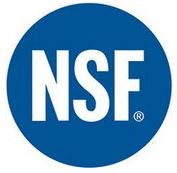 NSF International is an independent, not-for-profit organization that provides certification for dietary supplements. The NSF certification process includes: a) label reviews to verify product formulation and marketing claims b) formulation reviews to identify and quantify the dietary ingredients declared on the label c) contaminant testing and d) GMP facility inspection.
NSF International is an independent, not-for-profit organization that provides certification for dietary supplements. The NSF certification process includes: a) label reviews to verify product formulation and marketing claims b) formulation reviews to identify and quantify the dietary ingredients declared on the label c) contaminant testing and d) GMP facility inspection.
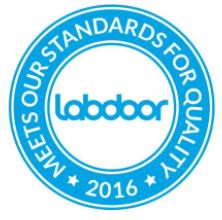 Labdoor is an independent company who buy products off retail shelves and online. And send the supplements to a FDA-registered lab for analysis. The analysis includes measurements of active ingredients and potential contaminants. Labdoor then generates a ranking on each product and publishes the results on their website you can access for free.
Labdoor is an independent company who buy products off retail shelves and online. And send the supplements to a FDA-registered lab for analysis. The analysis includes measurements of active ingredients and potential contaminants. Labdoor then generates a ranking on each product and publishes the results on their website you can access for free.
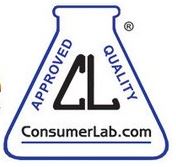 Consumer Lab is an independent, subscription-based service that tests dietary supplements and offers the test analysis to their members. The company selects products to review. And also accepts submissions from supplement manufacturers for their review and analysis. Their testing methods include a yearly GMP review, and a comprehensive spectrum of lab tests for each supplement.
Consumer Lab is an independent, subscription-based service that tests dietary supplements and offers the test analysis to their members. The company selects products to review. And also accepts submissions from supplement manufacturers for their review and analysis. Their testing methods include a yearly GMP review, and a comprehensive spectrum of lab tests for each supplement.
A word of a caution about Consumer Lab however – the company does not disclose the brand names of supplements that fail their testing if the manufacturer has paid them their $4,000 yearly fee.
And Consumer Lab “reviews” of supplements are heavily biased in favor of conventional, mainstream medicine. Any experienced neurohacker will notice a lack of knowledge in their recommendations because they are not based on natural or alternative medicine. I recommend only using them for supplement ingredient analysis.
-
Therapeutic Dosages
To make it simple, there is no established “therapeutic dosage” level for individual dietary supplements. Most labels provide commonly used and safe dosage recommendations.
These doses are often too low to provide cognitive benefit. I recommend following dosage instructions for each of the nootropics on the Nootropics Expert® Nootropics List. The dosage recommendations are based on clinical trials, user reviews and personal experience.
If you’re trying a nootropic supplement for the first time, always start with the lowest suggested dose and see how you react.
-
Other Ingredients
Check most supplement bottle labels and you’ll see a list of so-called “inactive” ingredients. Often called “other ingredients”, this list includes chemical sounding names you likely will not recognize.
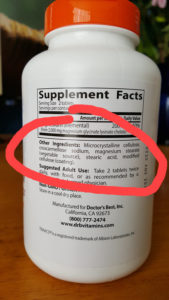 The list of “other ingredients” on supplement labels are used to increase shelf life, bind tablets together, improve consistency, improve moisture resistance, help stabilize ingredients, add bulk (to fill a capsule), and add color and flavor.
The list of “other ingredients” on supplement labels are used to increase shelf life, bind tablets together, improve consistency, improve moisture resistance, help stabilize ingredients, add bulk (to fill a capsule), and add color and flavor.
“Excipients” is a general term you’ll encounter on some supplement labels. And includes any one of the “other ingredients” I explain below.
The FDA does regulate these ingredients as food additives. And ‘officially’ are considered safe in small quantities. Nootropic supplement labels sometimes include:
- Cellulose – a binding, or thickening agent, or otherwise augmenting the consistency of the ingredients – sometimes the capsule is made of cellulose
- Magnesium stearate (vegetable stearate, stearic acid) – a “flow agent” or lubricant that speeds up the manufacturing process and is used because it prevents ingredients from sticking to mechanical equipment – also makes the tablet easier to swallow – the problem with magnesium stearate is it suppresses your natural killer T-cells which are a key component of your immune system[vi]
- Titanium Dioxide – a pigment used to color a supplement – the problem with titanium dioxide is it leads to mitochondrial dysfunction[vii], damages astrocyte cells which leaves them unable to absorb glutamate, and induces potent oxidative stress and mitochondrial damage in glial cells.[viii] All damaging brain health and cognition.
- Silica (silicon dioxide) -acts as an anti-clumping agent that prevents ingredients sticking to mechanical equipment, and ensuring even distribution of active ingredients throughout the mix
- Rice flour – a filler used to fill the rest of the capsule
Those are the main ones found in a few well-known individual nootropic supplements. The full list of extra ingredients you may encounter contains dozens of ‘FDA-approved’ ingredients. Sometimes you simply can’t avoid one or more of these ingredients if it’s a nootropic you need to add to your stack.
But lately I’ve noticed new companies entering the dietary supplement market who avoid “other ingredients” all together. The thing is if you’re working on optimizing brain health, why consider a supplement with unnecessary, unhealthy “extra ingredients” in the first place?
The best nootropic supplements on the market have no extra ingredients. Mind Lab Pro®, and the Performance Lab® line of supplements have been the leaders in this industry because the only “other ingredients” including in their supplements are NutriCaps® capsules made from fermented tapioca.
Do your best to get nootropic supplements with zero “other ingredients”.
-
Bioavailability
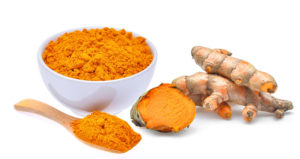 Some of the things you eat, and even some of the supplements you may select are not all ‘absorbed’ for use by your brain. For example, some of the important compounds found in the powerful nootropic Turmeric are poorly absorbed.
Some of the things you eat, and even some of the supplements you may select are not all ‘absorbed’ for use by your brain. For example, some of the important compounds found in the powerful nootropic Turmeric are poorly absorbed.
Another example is L-tyrosine which is an amino acid that is directly involved in the synthesis of dopamine, norepinephrine and epinephrine in your brain. But is not efficiently absorbed by your body when taken as a nootropic supplement.
To boost the bioavailability of L-Tyrosine, you may want to try N-Acetyl-L-Tyrosine (NALT) because it is said to be more bioavailable to your brain. I personally find both L-Tyrosine and NALT work equally well for my stack. But you may find you prefer one over the other after using each one for a week or two. Trial and error is key to success with nootropics.
The bioavailability of Turmeric can be boosted by 2000% simply by adding 20 mg Piperine when used as a nootropic.[ix]
Several nootropic supplements depend on the right form, or another ingredient they are stacked with, to ensure they work efficiently as a cognitive enhancer.
Read the dosage notes and suggestions here on Nootropics Expert® carefully for each nootropic supplement you intend to add to your stack. To make sure you’re getting all the value you can from your investment.
-
Extracts vs. Whole Herb
One of the most confusing things when choosing a supplement is reading a label. And trying to decipher if “whole root” is better than an “extract” reduced by some ratio. Or if a tincture is more effective than a capsule or tablet.
So what is a neurohacker to do? Well, it depends on the herb. And that’s where Nootropics Expert® saves the day.
Each of the dozens of nootropics on my Nootropics List has a full review of each nootropic supplement. Which includes “Recommended Dosage” and “Where to buy or Type to buy” with recommendations in each.
Turmeric is a classic example of a herb that works better as a ground powder for things like arthritis or an autoimmune condition. The Curcumin extracted from Turmeric works better as a nootropic for cognitive benefit.
Resveratrol purity is extremely important. And an extract from Japanese Knotweed provides more cognitive benefit than other forms of Resveratrol extract.
Lion’s Mane Mushroom dosing depends on the strength of the extract. Ashwagandha comes as a ground powder, or a standardized extract. And dosage of the extract is in mg compared to grams for plain powder.
So extracts vs whole herb is often critical to your buying decision. You can avoid buying the wrong supplement by reviewing the Nootropics Expert “where to buy or type to buy” in the review for the nootropic before you travel to the vitamin shop.
Nootropic Supplement Evaluation Checklist
When choosing a nootropic supplement brand, naturally we want supplements that are authentic and pure.
So with some due diligence and a “buyer beware” attitude, you now have the information you need to find supplement brands you can trust.
Use the recommendations here on Nootropics Expert® to help you select the best form of each nootropic supplement. And follow the dosage recommendations provided in each nootropic review.
Take this checklist with you each time you go supplement shopping. And keep these key criteria in mind as you select your nootropic supplements.
- Brand Name – choose and buy from reputable brands
- Quality – look for country of origin and choose certified organic (ignore “all natural”) if possible
- Certification – labels with seals like USP Verified or NSF International
- Bioavailability – use the review here on Nootropics Expert to choose the best form for cognitive function
- Other ingredients – select supplements containing only the ingredients you want with no extra additives of any kind
- Extracts – look for standardized extracts of most herbs
And be very suspicious of two identical bottles of a supplement with significantly different prices. The lower priced bottle is very likely counterfeit and will not contain the nootropic you are shopping for.
After your first couple of shopping trips you will have selected your most trusted brands. And this checklist will come to you automatically as you stand in front of the supplement shelf.

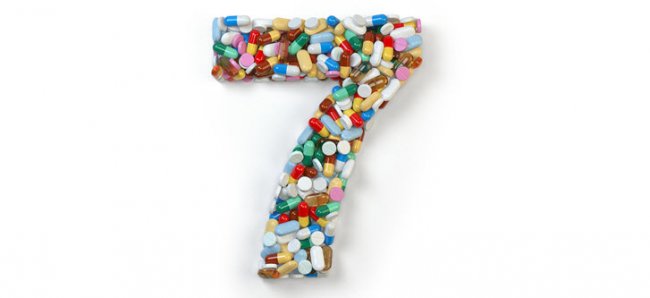






Join The Discussion - 37 comments
Martha
September 25, 2019
Hello, David,
Very excited to have found your website. My 17 yo son and I both have ADD. I believe his is even worse than mine.
First, I read your post on what you take. That must cost about $350/month? I realize its not necessary to take all that to start with but just the MindPro and PerfLab alone is around $190.
Does it really take such a huge investment to optimize brain health?
Also, my son was just prescribed Adderall. Are there any nootropics that adderall has a contraindication?
Thanks
David Tomen
September 27, 2019
Martha, that’s about right for the monthly cost of a really effective nootropic stack. But of course you don’t need to spend nearly that much depending on what you’re trying to do. I’ve had and continue to have some real health challenges and find that’s what I need.
The best way to support Adderall usage is explained in this post: https://nootropicsexpert.com/best-nootropics-for-adhd-add/. The basics are supporting acetylcholine, dopamine, serotonin and norepinephrine. No real contraindications for Adderall but it’ll work a lot better using the suggestions in that post including keeping the brain healthy and preventing a stimulant crash.
Robert Long
September 16, 2019
Regarding Magnesium stearate
– Jarrow (I assume a reputable company)
Has Magnesium stearate.
Other Ingredients
Cellulose, mannitol, glyceryl behenate, magnesium stearate (vegetable source), silicon dioxide, sodium starch glycolate and an enteric coating (modified cellulose, magnesium silicate, triethyl citrate and riboflavin).
Is the amount of such in a daily capsule enough to interfere with T-Cells?
David Tomen
September 16, 2019
Robert, it likely is enough to suppress natural killer T-cells. It makes me want to cry when I see a highly regarded manufacturer like Jarrow using this junk in their supplements. It is NOT necessary and why I change brands whenever possible.
Someone who is committed to producing only high quality, untainted supplements. And so far they are few and far between. Opti Nutra who make Mind Lab Pro and Performance Lab, most Bulk Supplement powders, and a new company called LongLifeNutri who makes a few supplements, come to mind as the most reputable manufacturers in the business.
Jonathan
August 27, 2020
Hi David,
Do you have any more follow up information regarding Magnesium stearate, and is there any way to manage or mitigate its effects on the body? It appears to be in everything!
I’ve just looked at my supplements and at least half of them contain it that I take multiple times daily. They’re all from seemingly reputable manufacturers like Jarrow and Now. Even HR supplements (in Phoenix AZ) and Nootropics depot (both of which I’ve seen you often recommend) have it in some of their products (Aniracetam and Noopept respectively).
Any thoughts would be appreciated.
Thanks in advance for you time.
David Tomen
August 29, 2020
Jonathan, magnesium stearate suppresses natural killer T-cells which are in integral part of your immune system. So I consider it toxic and avoid magnesium stearate if possible. And this is why I’m so careful about my choice of supplements.
Sometimes it is not possible to find a supplement that does not contain magnesium stearate. But if the majority of your supplements are all natural with zero “other ingredients” and only one or two of the rest contain magnesium stearate I risk it.
Try to keep your exposure to these toxic chemicals as low as possible. The danger in my opinion is when you’re using 3 or more different supplements daily that contain one of these toxic chemicals.
Robert Long
September 16, 2019
Just want to thank you for your amazing work!
I thought I could analyze! You’re the best on the Internet!
Thank you
LeAnn Sieler
August 16, 2019
I just ordered PEA from you
for neurological ,like RLS. I take Meripex as needed.
I also take 3.0 mg of LDN at night for the last 3 months because of Cipro antibiotic damage to my Mitochondria.
I was hoping that the PEA could replace the Meripex.
Any suggestions?
David Tomen
August 16, 2019
LeAnn, as far as I can tell Maripex (Pramipexole) is a dopamine receptor agonist. But very specific dopamine receptors (i.e. D3s, D2L, D3 and D4). Which affects how dopamine works in certain areas of the brain.
Phenylethylamine (PEA) is a trace amine naturally synthesized from L-Phenylalanine in your brain. Aromatic amino-acid decarboxylase converts phenylalanine to phenylethylamine. This is the same enzyme that converts phenylalanine into dopamine. And it converts it at a rate comparable to the synthesis of dopamine.
But PEA is not retained in neuronal vesicles like dopamine is stored. Instead, monoamine oxidase-B (MAO-B) quickly degrades PEA.
What are you trying to accomplish with PEA? If it’s to boost dopamine, you have far better options available. Including L-Tyrosine, N-Acetyl L-Tyrosine or Mucuna Pruriens (L-DOPA).
There is no natural nootropic supplement that works exactly like Maripex.
Bren
June 22, 2019
Hello,
I wanted to get your opinion on the Nootropic Depot brand and whether you think they are good brand to buy nootropics from. Please let me know. Thank you very much in advance.
David Tomen
June 22, 2019
Bren, I’ve been getting Aniracetam and Sulbutiamine from Nootropics Depot and it’s good quality.
Peter
October 7, 2018
Hello David,
Just came across your website. I’m finding it extremely useful. Thank you. Regarding the Canadian study “Just one of many examples over the last few years comes from a 2013 investigation by Canadian researchers. The team used DNA testing on 44 bottles of brand name supplements sold by 12 companies.” I remember when this came out, someone (perhaps a supplement manufacturer) pointed out that the supplements cannot be expected to have DNA of the source when they’ve been processed to extract active ingredients. I can see that being the case for at least some supplements. Do you have any more information about the study? Was it right for them to expect identifiable DNA in the final product(s)?
David Tomen
October 8, 2018
Peter, logic tells me that DNA of the target compound should be in the supplement even if it’s an extract. Other types of ‘fingerprinting’ may not be relevant. But then again, I’m not a chemist and this is only a guess.
The big take-away from all these studies in my opinion should be that we need to be careful about what we buy. A few manufacturers have established a reputation for testing extensively and putting out quality product. But it’s up to us as consumers to keep them on their toes. And make sure they don’t relax their standards when on one is looking.
Alex
December 30, 2017
I’m going to betaking Mind Lab Pro and was wondering if you can take Huperzine-A with it and how much. My memory is getting worst.I had a severe head injury when I was 7. I had an almost photographic memory and I have had a couple of others as well, like breaking the windshield of a car in an accident.
David Tomen
December 31, 2017
Alex, yes you can take Huperzine-A with Mind Lab Pro. It used to be in the stack but was taken out because you should not use Hup-A every day. Please follow the dosage recommendations in this review > https://nootropicsexpert.com/huperzine-a/
Also, please study the entire post I wrote for treating traumatic brain injury here > https://nootropicsexpert.com/best-nootropics-for-traumatic-brain-injury/. The symptoms of TBI can be addressed if you know what is causing your issues. Then find and start experimenting with nootropic supplements that have been proven to work to relieve those symptoms.
Derek McDoogle
September 23, 2017
I had no idea that important nootropics from turmeric aren’t always absorbed by your body. I will make sure to keep this in mind when I shop for more supplements online later today. I love turmeric, but I want to make sure my body is using it correctly. Thanks so much for your lovely advice and incredible insights.